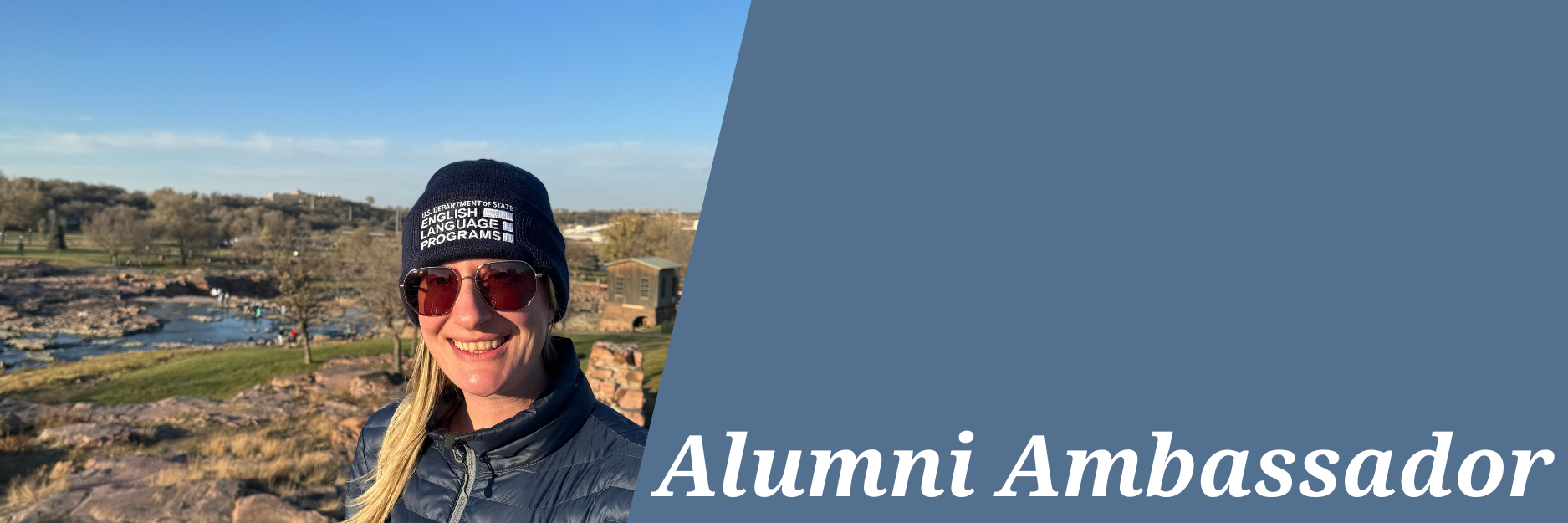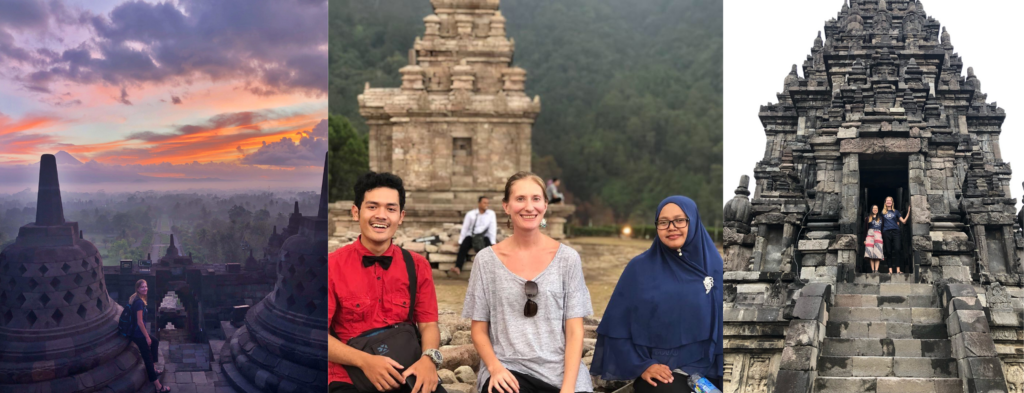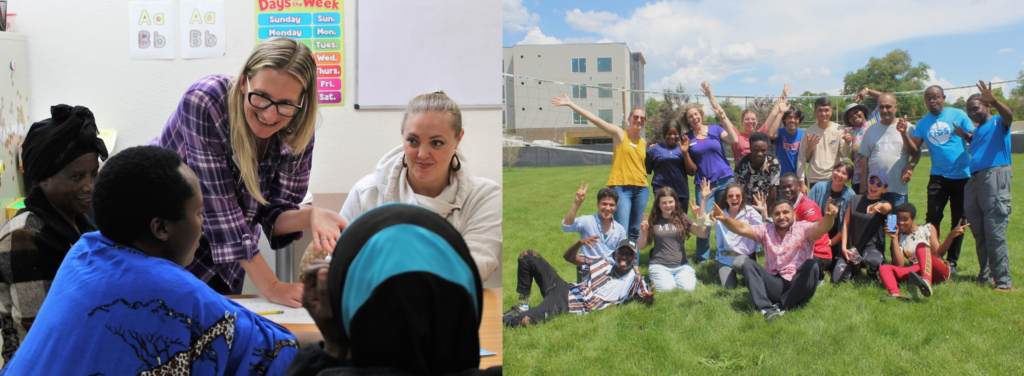“Being a Fellow in Indonesia had a positive impact on all aspects of my life,” said Devon Jancin, who was an English Language Fellow in Indonesia, 2018-2020, and is a member of the 2023-2024 Alumni Ambassador cohort. “The warmth of Indonesian culture that I experienced really helped me open up more on a personal level, and I made lifelong friends, both other Fellows and Indonesians in my community.” From a professional standpoint, Jancin said her fellowship not only prepared her for her current role as a Curriculum Coordinator at the Idaho Office for Refugees, but it also opened the door to it: She found the job on the Jobs page of the English Language Programs online Community of Practice.
“Most importantly to me, the very nature of being a Fellow means that I was able to stretch my comfort zone and add a plethora of tools to my teaching toolbox,” Jancin said, noting that empathy, creativity, adaptability, collaboration, and teaching with limited resources were some of the skills she “practiced everyday as a Fellow.” Since her fellowship, Jancin has been giving numerous presentations and workshops at various professional development events around the U.S., including several as an Alumni Ambassador. She’s now looking forward to attending the upcoming 2024 TESOL International Convention, where she’ll join her Alumni Ambassador cohort in sharing program experiences and connecting with new educators.
Jancin facilitating a teacher training workshop on ‘Promoting Active Learning’ for fifty teachers at a public vocational high school in Central Java, Indonesia
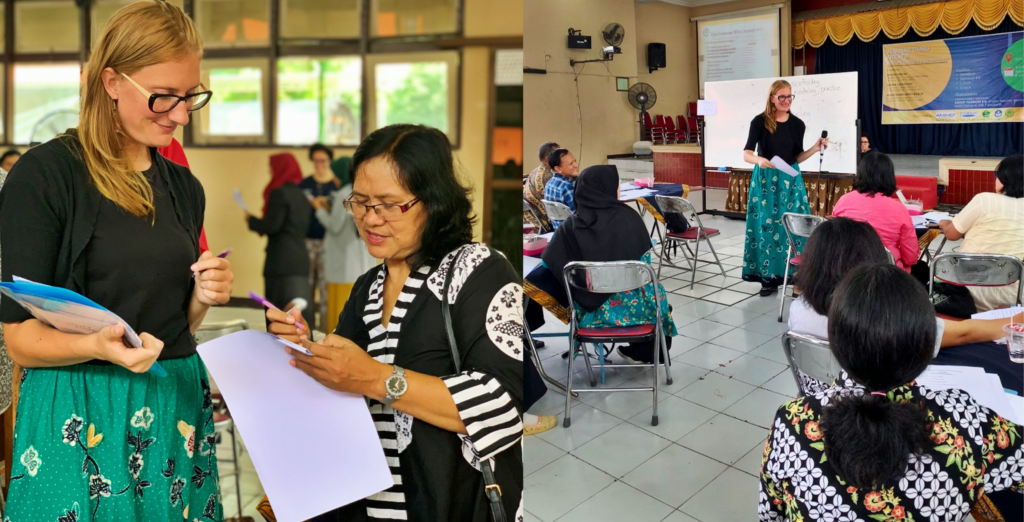
For her primary duties during her fellowship, Jancin worked as an instructor in the English Education department at her host institution, Islamic State University of Salatiga. She taught more than 450 pre-service teachers English and pedagogy, created and implemented eight different content-based instruction university courses, and helped support several different student clubs and staff professional development sessions. For her secondary duties, she conducted in-service train-the-trainer workshops all across Indonesia, and facilitated numerous cultural exchange workshops with K-12 children. “I loved visiting so many different schools and getting the students excited about learning and using English,” Jancin said. For another secondary project, Jancin joined Fellow Rachel Wang in working with local scuba instructors on an island off the coast of Manado, Indonesia.
The teaching challenges Jancin learned to navigate as a Fellow have served her well in her current role supporting newly arrived refugees to the U.S. “Before my fellowship, I would have been thrown by the prospect of getting twenty-five new students each week due to rolling enrollment, but because I learned strategies for large classes as a Fellow, I have an advantage,” Jancin said. Cultivating her skills teaching in low resource and low tech contexts as a Fellow has also had a direct impact on her current work. “Finding effective ways to teach students who had limited computer and phone access fully online during the pandemic was also something I gained experience with during my fellowship,” Jancin said. “This experience enabled me to help the English Language Center develop fully online synchronous classes on WhatsApp to great effect.”
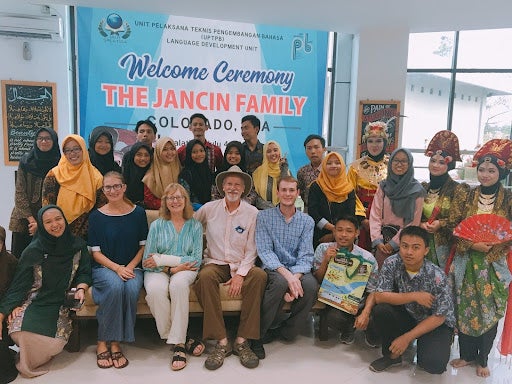
Jancin’s parents and brother were greeted with a welcome ceremony when they visited her host institution, Islamic State University of Salatiga
A highlight of Jancin’s time in Indonesia was sharing her experience with her parents and her brother when they came to visit. It was a moment in time that her family still reminisces about years later. “I’ll never forget the joy of meaningful cultural exchange as my immediate family and my Indonesian work family got to know each other,” Jancin reflected. “My family was so touched that my host institution held a welcome event for them, complete with their own banner. We had some traditional snacks, and some of my students performed traditional Javanese dance and music. Then, we had small group conversation partners and the students and staff were able to practice their English while chatting with my family.”
Jancin adored exploring Indonesia’s vast, multifaceted cultural and culinary offerings. Made up of over 17,000 islands, Indonesia is the world’s largest island country, and each island Jancin visited often felt like “its own separate country,” complete with different customs, ways of dressing, and food. “Oh, the food!” Jancin said. “Each time I went to a new place, I would try their local ‘sambal’ (spicy sauce) because they were all very unique. Next door to my friend’s property was a locally famous place known for its snails. They were really good, they came from the rivers and rice fields nearby, as did the freshwater eels, which are delicious fried. There was a Chinese Indonesian food stand in my neighborhood that had the best fried noodles (‘mie goreng’) and fried rice (‘nasi goreng’) that I still crave.”
Two of Jancin’s favorite Indonesian dishes: sambal with soto ayam (chicken soup with rice) and tempeh, which originated in Java (left), and nasi goreng (fried rice) served in a banana leaf (right)
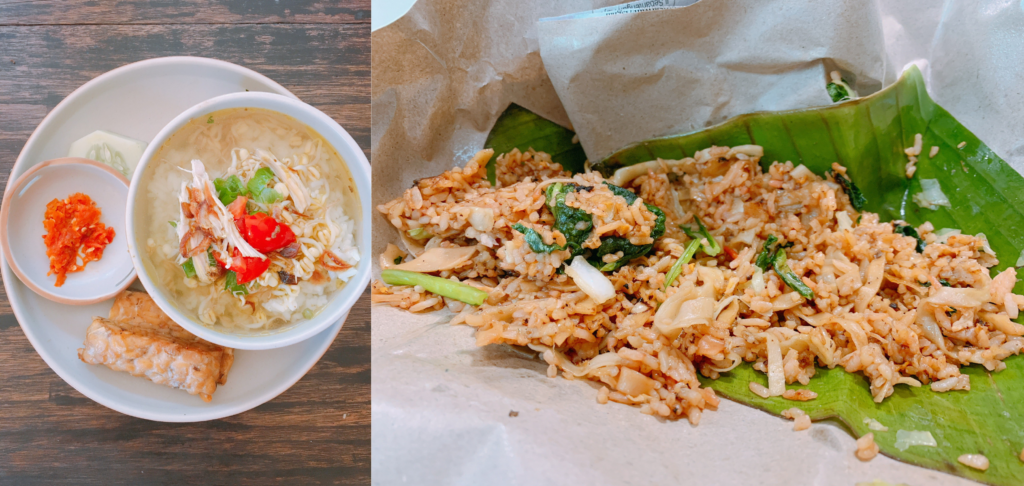
Majestic temples from the ancient world were merely a few hours drive away. “I felt so lucky to live close to Prambanan Hindu temple and Borobudur Buddhist temple, both UNESCO World Heritage sites,” Jancin said. “We brought some of our students there my first year as a Fellow, and it was very meaningful to get to experience the historical sites for the first time with them.”
In her current role as a Curriculum Coordinator at the English Language Center Boise, a non-profit program of the Idaho Office for Refugees, Jancin creates and implements curriculum and new projects, teaches students and staff, develops assessments, works with community volunteers, and supports onboarding for about 10-20 new Americans each week. “As someone who, during my fellowship, was warmly welcomed and made to feel at home in a foreign country, much of the work I do now is trying to emulate this by welcoming new Americans to my home country,” Jancin said, noting that her institution shares “the common thread of open-minded exchange of culture and skills” that she cultivated during her time as a Fellow and a Peace Corps Volunteer.
As a Fellow alum, Jancin has continued to share her work and experiences in numerous presentations, as well as pursue professional development opportunities. She delivered a presentation titled “Addressing the Digital Divide and Increasing Access With WhatsApp Class” at both ITESOL 2021 and the TESOL 2023 Convention in Portland, Oregon. “For this presentation, I was very grateful for the colleagues I had in Indonesia because I learned a tremendous amount from them regarding online strategies that greatly help my refugee students now,” Jancin said. “Being able to present about how some of these ideas have developed in the past few years was personally very impactful.”
After crafting her tale “Tea for 1,000” about her experience helping out at a wedding in Indonesia, Jancin was selected as a storyteller in the program’s annual online community event, Stories from the Field. As a guest speaker at the virtual Fellow Pre-Departure Orientation in 2022, she shared her story again for outgoing Fellows. Continuing to develop her credentials, Jancin completed the English Language Programs Training of Trainers Course, and earned certifications in Adult Mental Health First Aid through the National Council for Mental Wellbeing and Human Rights through the Wassmuth Center, which further prepared her to focus on trauma-informed teaching. She has been involved with the Annual Idaho Conference on Refugees the past 3 years; and over the past year as an Alumni Ambassador, she has attended CoTESOL, Dakota TESOL, and the Fellow Pre-Departure Orientation in Washington, D.C.
Looking ahead, Jancin is excited about supporting the new Employer Engagement Program at her job, working with a new team and new stakeholders to develop curriculum to help refugees attain self-sufficiency, job retention, and professional advancement through partnerships with Idaho employers. She’s also interested in pursuing more international projects and has applied to be an English Language Specialist.
As someone who applied twice before becoming a Fellow and before becoming an Alumni Ambassador, Jancin feels well-positioned to lend encouragement to prospective applicants and program alumni seeking new roles. “I do like to model what we tell our students during their applications— keep trying, it’s a process!” Jancin said, adding that she believes passing down institutional knowledge and experience to help support people is part of “the teacher code.” Working with many young teachers now in her current role, Jancin wants to make them aware of future opportunities with exchange programs. “There is nothing like meaningful life experience to increase a teacher’s effectiveness,” Jancin said. “And being an English Language Fellow is a highly impactful, world-expanding way to do just that.”
Stay tuned for our next featured Alumni Ambassador story with Mayonne Granzo.

